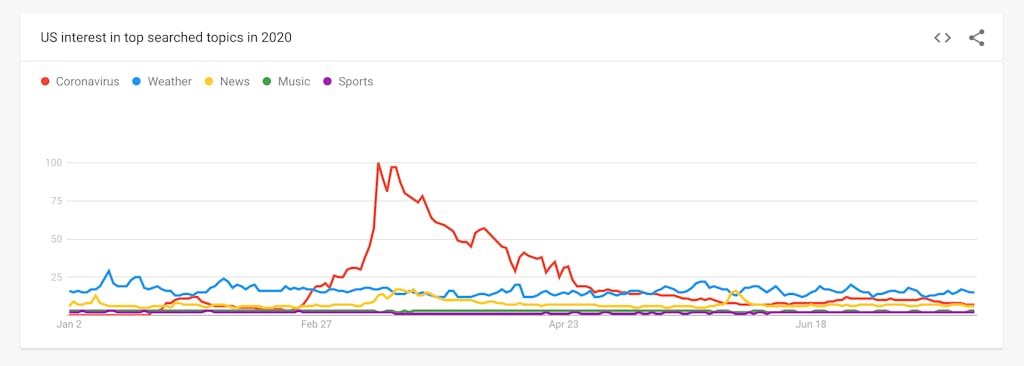- 4 minute read
- Digital Marketing
- SEO
3 Simple Blog Writing Tips to Grow Engagement and Conversions
All Skill Levels
Get a behind-the-scenes-look into FareHarbor's 2024 season

The COVID-19 pandemic has shaped many parts of our lives since March 2020, so you probably won’t be surprised to learn that COVID-19-related searches are now the most popular searches on Google – outpacing searches about politics, news, and even navigational searches for huge sites like Amazon and Facebook. Knowing that COVID-19 is affecting search trends, it’s important to adjust your SEO strategy accordingly to help your business continue to appear at the top of the SERP for relevant queries. This guide will cover how search trends and shifting and what you can do to keep up.
To help keep track of the surge in pandemic-related searches, Google created the Google Trends Coronavirus Hub, which tracks emerging searches to give you an idea of the most popular queries. These trends also reveal search patterns. For example, COVID-19 searches spike in the early morning and late at night because these are times of day when people can catch up on news and look up answers to the questions that have been on their minds.

There are certain kinds of keywords that have been surging as a result of the pandemic.
 How-to keywords: How-to and at-home searches have become extremely popular as people try to learn how to do things at home. These searches include hobbies, at-home grooming, financial information, recipes, and more.
How-to keywords: How-to and at-home searches have become extremely popular as people try to learn how to do things at home. These searches include hobbies, at-home grooming, financial information, recipes, and more. Even if your business’s in-person operations have slowed down, or even temporarily shut down, during the pandemic it is critical to continue your SEO and digital marketing efforts. Working on digital strategies like your SEO will help you maintain and improve your online presence during and after the pandemic. Here are a few reasons why it’s so important.
People are looking to stay close to home, so searches for nearby local businesses and services are on the rise. Using local SEO tactics to optimize for “near me” and “open now” queries is crucial to help you appear in local searches.
 Pro-tip: Local search during COVID times often means anything that equates to a drive-to location – that is, can someone drive from their home to participate in your tour or activity.
Pro-tip: Local search during COVID times often means anything that equates to a drive-to location – that is, can someone drive from their home to participate in your tour or activity.
People want to support the businesses in their community to help them stay afloat. This has led to movements like #supportsmallbusiness and #iwilltravelagain around the world, inspiring consumers to choose their local businesses over big brands. Local SEO tactics come into play here, helping connect you with customers who want to support businesses like yours.
Chances are you have more free time to work on digital strategies if your in-person hours are reduced. Use this time wisely to focus on your SEO efforts, and you’ll see the benefits both during and after the pandemic. Spend some time employing the tactics below!
The pandemic is a serious issue that has been top-of-mind for all of us, but we should remember that it will eventually pass. Content related to the pandemic might give you a traffic lift right now, but it will be relatively short-lived. Don’t forget about your long-term goals and continue to write evergreen content for your blog and social media. If you find yourself with a bit of extra time on your hands, use it to write future blog posts that you can publish post-pandemic.
In the short-term, consider targeting relevant trending terms to help improve your traffic. Avoid broad search terms, as these will have a lot of competition among high-authority sites like news publications. Instead, focus on long-tail searches that are specific to your industry or your location. Do some keyword research on popular how-to searches that are relevant to your business, and optimize any pages about online offerings to make sure customers can easily find them. This will set you up for ranking success, helping you reach searchers looking for that highly specific content.
While the pandemic is driving all kinds of new searches, they’re not always for COVID-19 related terms. For example, avid kayakers who can’t go to their favorite kayaking spots right now might be looking for workouts they can do at home or other ways to enjoy the summer without risking being in a big crowd. Think about the specific needs and interests of your customers, and come up with unique content that will help you appear in their searches. Take a look at Facebook groups and other interest groups to get some ideas on the creative ways people are adapting and what kind of content gaps you can fill.
Even high performing content needs to be reviewed from time to time to make sure it is still properly optimized. Take a few minutes to look over and polish these posts to ensure you maintain, or even improve, your rankings.
Follow this checklist to perform a more in-depth content audit.
Your GMB profile provides real-time information specific to your business that helps customers quickly figure out if you are open, if you are close to their location, and whether you’re offering services during the pandemic that are compliant with all the safety guidelines. As part of your local marketing strategy during COVID-19 you must keep your GMB profile accurate and up to date. You can find more optimization tips in our COVID-19 GMB checklist.
Your GMB listing is one of your most useful online assets during the pandemic, but it’s only one part of your local SEO strategy. It’s important to also keep an eye on other listings throughout the web because they serve as citations for your website, adding to its visibility and legitimacy. Google looks at the quality and accuracy of your listings as well as consistency across the board. Round up a list of all your listings on local and global directories, then check out each one to make sure it has the most accurate and up-to-date information, including contact information, location, and hours of operation.
Having your business featured in an article on a local media publication is a great way to get authoritative links to your website. Put together a press release and highlight information you want readers to know about your business – such as updated health and safety guidelines, your involvement in the community, or new virtual offerings. Send the release out to local publications to see if they’re interested in writing an article about your business. Make sure you ask them to include a link to your website to create a quality backlink!
The COVID-19 pandemic has brought financial burdens for small businesses, slowing the pace of business. SEO is a great solution to start bouncing back. Focus your short-term goals on COVID-19-related searches, while making sure your long-term goals are still focused on evergreen keywords for your business.
For more business tips during the pandemic, read our guide on communicating your health and safety guidelines on your website and check out the COVID-19 Resources page. For a more in-depth review of digital marketing strategies to employ during the pandemic, we’ve put together this guide.